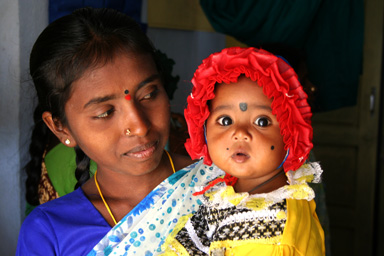Advancing Newborn Health through WASH
|

One of my brothers recently asked me, “What was the happiest day of your life?” My response: “The days your sons were born!” My happiness was directly linked to boys' safe delivery and arrival in this world. I adore my nephews - now one and three - and love being such an active part of their lives.
Imagine the harsh reality for the 2.9 million familieswhose days were vastly different; in 2012, their newborns died after only one month. It may be surprising to learn that many of these deaths were due to things we often take for granted in the developed world: safe drinking water, sanitation, and hygiene (WASH). Quite simply, these deaths could have been prevented.
Birthing conditions in much of the world are often unhygienic. Many women give birth at home on the floor or in hospitals and clinics on dirty tables. Umbilical cords are cut with dirty knives, and infants are bathed in contaminated water. In some cultures, it is common to apply substances to the cord cutting such as ash or mud. Without running water and soap, birth attendants and family members can unknowingly pass on bacteria. All of these conditions lead to dangerous infections for both infants and their moms.
Making it safely through delivery doesn't mean a baby is out of danger. In areas without adequate sanitation, the water quality is often poor. Formula mixed with unsafe drinking water can cause diarrhea, the second leading killer disease in children under five. A recent study found that infants without piped water or toilets who were not breastfed are five times more likelyto die after one week that those who were breastfed.
The news isn't all gloomy! There are simple solutions that can help newborns in their first weeks. Handwashing with soap is one of the most cost-effective health interventions. A study in Nepal showed that handwashing by birth attendants and mothers helped reduce newborn deaths by 41 percent. Breastfeeding can also reduce WASH-related disease in newborns by decreasing exposure to harmful bacteria in food and water and improving resistance to infection.
Improved access to water, sanitation, and hygiene (WASH) can help improve newborn survival, and international health experts are starting to pay attention. Here are three examples:
1) Of the ten recommended actions to save and improve the lives of children in UNICEF's A Promise Renewed 2013 progress report, three are related to WASH:
- Have children drink water from a safe source, including water that has been purified and kept clean and covered, away from fecal material.
- Have all children wash their hands with soap and water especially before touching food, after going to the latrine or toilet and after dealing with refuse.
- Have all children use a toilet or latrine, and safely dispose of children's feces; prevent children from defecating in the open.
These interventions are all doable… provided a community has access to WASH.
2) The Every Newborn Action Plan- which launches this spring at the World Health Assembly and will be highlighted at The Partnership for Maternal, Newborn & Child Health (PMNCH) Partners' Forum this summer - incorporates WASH.
3) PMNCH will launch a “knowledge summary” on WASH and MNCH this spring which calls for increased efforts to integrate programming.
Newborn deaths are preventable. Babies do not need to die because of poor WASH. Please join me in supporting these initiatives and helping to ensure more aunts like me get to watch their nephews (and nieces!) grow and thrive.
Rebecca Fishman focuses on the importance of water, sanitation, and hygiene to the health, education, empowerment, and safety of women and children for WASH Advocates.














